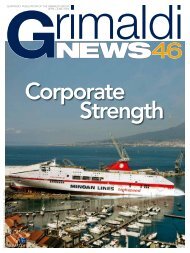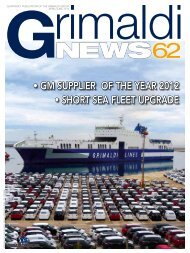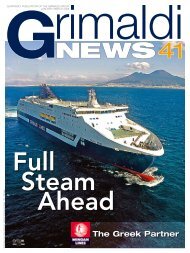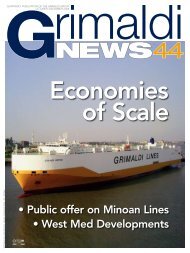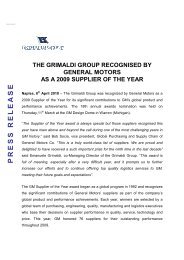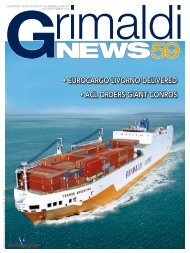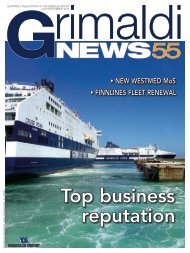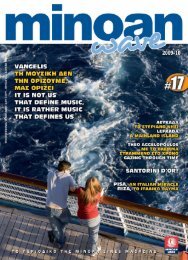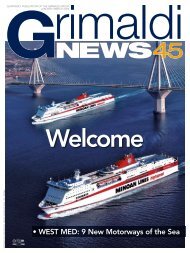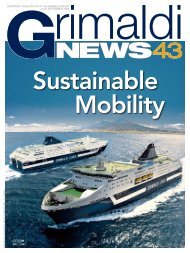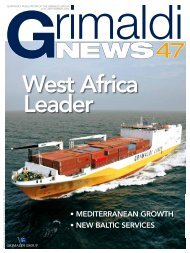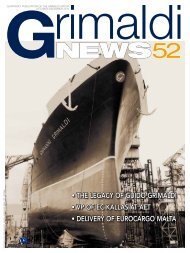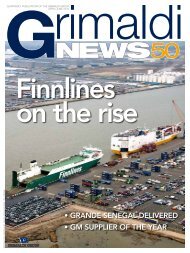Irresponsible shipowners have been a danger to ... - Grimaldi Group
Irresponsible shipowners have been a danger to ... - Grimaldi Group
Irresponsible shipowners have been a danger to ... - Grimaldi Group
You also want an ePaper? Increase the reach of your titles
YUMPU automatically turns print PDFs into web optimized ePapers that Google loves.
XXXXXXXXXXX ediTorial<br />
Contents<br />
2 Guido <strong>Grimaldi</strong>, an innova<strong>to</strong>r<br />
4 A generous man and<br />
a kind father<br />
7 “Grande Togo” christened,<br />
“Eurocargo Genova” delivered<br />
8 Siim Kalls at AET<br />
9 New era in Ancona‑Greece<br />
maritime links<br />
10 New Livorno‑Catania ‑Malta<br />
service launched<br />
Irish Minister of Defence<br />
visits the “Grande Senegal”<br />
11 <strong>Grimaldi</strong> receives the<br />
Ford Q1 certification<br />
12 Honda recognises ACL<br />
Beninese Minister visits<br />
the m/v Grande Benin<br />
13 News<br />
14 Agent List<br />
15 Schedules<br />
- Mediterranean Short Sea Network<br />
- Finnlines (Baltic & North Sea)<br />
- Atlantic Network<br />
- ACL<br />
- Euro Med Network<br />
Gr imaldi<br />
NE WS<br />
Diret<strong>to</strong>re Responsabile / Edi<strong>to</strong>r in Chief<br />
Luciano Bosso<br />
Proget<strong>to</strong> grafico /Graphic design<br />
Marco Di Lorenzo<br />
Pubblicazione trimestrale<br />
Quarterly publication<br />
Reg. Trib. Napoli n. 5150 del 26/9/2000<br />
Stampa / Print: ROSSI srl - Nola (Napoli)<br />
Circulation 34,500 copies<br />
Printed on 1st Oc<strong>to</strong>ber 2010<br />
GRIMALDI GROUP<br />
Via Marchese Campodisola, 13<br />
6 GNE WS80133<br />
NAPOLI (Italy)<br />
<strong>Grimaldi</strong> News can be seen on<br />
line on www.grimaldi.napoli.it<br />
Time for Europe <strong>to</strong> act<br />
<strong>Irresponsible</strong> <strong>shipowners</strong> <strong>have</strong> <strong>been</strong> a <strong>danger</strong> <strong>to</strong> life, limb and property ever since man<br />
first <strong>to</strong>ok <strong>to</strong> the sea in ships, but rarely can the <strong>danger</strong>s posed by the sub-standard owner<br />
and his sub-standard vessel <strong>have</strong> <strong>been</strong> so various or threatening as they are <strong>to</strong>day.<br />
As world trade has expanded, so <strong>to</strong>o has the world fleet. The boom that came before the<br />
crash provided an opportunity for fleet replacement and many far-sighted, responsible owners<br />
<strong>to</strong>ok the opportunity offered by surging profits <strong>to</strong> order new ships and despatch older<br />
vessels <strong>to</strong> the breakers’ yard.<br />
Yet many did not. Even now, the world’s oceans are full of vessels in excess of 30 years of<br />
age, or even 40, which is surely well past any reasonable retirement age. While the age of<br />
a ship may not correlate exactly with its quality, it is also true that, as vessels age, necessary<br />
maintenance becomes more critical and more costly. Some owners are simply not<br />
prepared for the investment, whether in money, time or organisation, that keeping their ship<br />
safe entails.<br />
And yet the need <strong>to</strong> focus on the structural integrity of the fleet has never <strong>been</strong> more acute.<br />
As <strong>shipowners</strong>, we <strong>have</strong> a responsibility <strong>to</strong> our crews, who trust us <strong>to</strong> maintain, at a very<br />
minimum, the standards of training and vessel quality required under international regulation.<br />
This need is pressing at a time when attracting bright young people <strong>to</strong> our industry<br />
is increasingly difficult. For those of us who carry passengers, there is a similar need <strong>to</strong><br />
ensure we meet our cus<strong>to</strong>mers’ expectation that our ships are state-of-the-art in every way.<br />
As citizens, we also <strong>have</strong> a responsibility <strong>to</strong> the marine environment, and <strong>to</strong> the children<br />
and grandchildren who will inherit the seas we leave behind. Of all the transport modes,<br />
shipping may be the most environmentally friendly, but that does not mean we <strong>have</strong> done<br />
all that we can do.<br />
As we debate new emissions standards and work <strong>to</strong> develop and implement energy efficiencies<br />
both onboard and ashore, the continuing employment of old, sub-standard <strong>to</strong>nnage<br />
is both an affront <strong>to</strong> those of us fighting <strong>to</strong> make a difference, and paying the cost,<br />
and a blow <strong>to</strong> our chances of reducing shipping’s impact on the environment.<br />
At <strong>Grimaldi</strong>, we <strong>have</strong> <strong>been</strong> fighting the good fight for some time, working <strong>to</strong> cut energy use<br />
across the company, collaborating on research projects <strong>to</strong> develop new, environmentally<br />
beneficial technologies, and ordering state-of-the-art new ships <strong>to</strong> replace older vessels.<br />
As a result, the 87 ships in the <strong>Grimaldi</strong> fleet <strong>have</strong> an average age of just 9.3 years, below<br />
the average age of the european (about ten years) and world fleet (12 years). With 21 ships<br />
delivered over the last five years and 17 more <strong>to</strong> come, that will drop further, improving the<br />
company’s performance and reinforcing its reputation as a careful steward of our cus<strong>to</strong>mers,<br />
our seafarers and the environment in which we operate.<br />
Yet there is only so much that we and other responsible <strong>shipowners</strong> and opera<strong>to</strong>rs can do<br />
<strong>to</strong> make a difference if others continue <strong>to</strong> operate old and sub-standard <strong>to</strong>nnage with impunity.<br />
That is why we are calling for European regulation that would mandate the scrapping<br />
of all vessels over 30 years of age, effectively driving them from our ports and waters.<br />
Such regulation, strictly enforced with the assistance of classification societies, flag states<br />
and port states, will not only improve standards of safety and remove a significant threat <strong>to</strong><br />
the environment but help rebalance markets in which the supply of ships far outstrips demand,<br />
en<strong>danger</strong>ing the economic survival of many sound companies. The benefits of such<br />
a policy are many, the down side negligible. The time <strong>to</strong> act is now.



